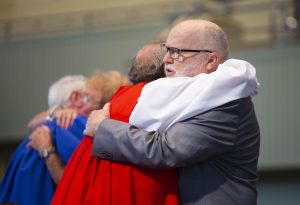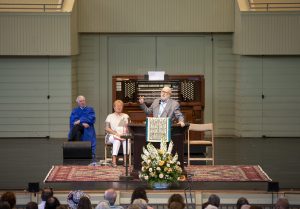
Throughout Week Four at Chautauqua, Fr. Richard Rohr, OFM, has led the Ecumenical Services in the Amphitheater. He has spoken on topics like the differences in the depiction of Jesus Christ between Eastern and Western Christianity and Pantheism.
At the 9:15 a.m. Friday Ecumenical Service in the Amphitheater, Rohr left Chautauquans with a note on the Gospel as a collective message, infinite love and putting some trust in God.
His sermon title was “Christ is not Jesus’ Last Name,” and the Scripture text was 1 Peter 1:3-9.
The Gospel is a collective message, according to Rohr.
“Both goodness and evil are, first of all, understood in the entire trajectory of the Bible in a collective way,” Rohr said. “Starting with the covenants with Israel — all of them are formed maybe through David, through Abraham, through Noah, through Moses — but always with Israel.”
Rohr cited God’s covenant with Noah described in Genesis, which says “I am making this covenant with all of creation.”
But despite this message that encompasses all of creation, human beings have long understood the Gospel in an individualistic manner. It’s about “you getting saved,” and “you getting saved,” and “you getting saved” — this interpretation, according to Rohr, has led humans to be selfish.
“If you want to go (to Heaven) without ‘me,’ it’s not Heaven,” he said. “If I want to go there without ‘you,’ it’s not Heaven. … Salvation is a social, historical message for humanity, for reality.”
And it’s difficult to heal a person with a collective message that centers on threats. Rohr told the congregation that threats don’t heal or invite people — this collective, or in other words, the culture, “carries the illusions, the deceit and the darkness.”
He said that one aspect of his book, The Universal Christ: How a Forgotten Reality Can Change Everything We See, Hope For, and Believe, is that the Apostle Paul has a “code word” for the collective: en Christo, translated to “in Christ.” This term is used by Paul 134 times.

MHARI SHAW/STAFF PHOTOGRAPHER
“We’re so used to hearing (in Christ), it slips off our tongue,” Rohr said. “It’s a participatory notion, it’s a collective notion; the Jesus train; the God train; the love train; the salvation train, is already in motion. And all we can do is agree to jump on or not.”
Infinite love, Rohr told the congregation, is something that many early fathers of the church said no one can resist. However, as he noted during the Service of Worship and Sermon on Sunday, people can’t conceptualize infinity, or something that is infinite.
“So we tried to parcel (love) out and decide who was worthy,” Rohr said. “Are any of us (worthy)? Are you worthy? Come on, don’t even go there. Don’t even play that game. All it can do is lead you into denial, and projection and pretend. Let’s not play the worthiness game. Let’s allow for the infinite gift of mercy that Peter just talked about in this reading.”
Throughout history, people have tried to quantify things like love and sin, according to Rohr. When people think of purgatory, for example, they conceptualize it in a literal sense — “this much sin (equals) this much burning.”
“(But) the only language possible to religion is metaphor,” Rohr said. “It’s the most helpful because it allows the soul to fill in the gaps with its own experience, to struggle with it like the Jewish people did with Midrash.”
Rohr returned to the concept of en Christo, and said that God is doing “to humanity, with humanity, in humanity, for humanity, largely in spite of us.”
“All it seems God needs is a little bit of ‘yes,’ a little bit of trust,” Rohr said. “A little bit of love. And from what I’ve experienced this week (at Chautauqua), there’s a lot of (love) here.”
And he said that love sustains the universe; it moves us toward “a future of resurrection.”
“Some of us, some of you, are carrying that love better than others, frankly,” Rohr said. “But we do not need to call it love — because then we’ll start measuring — or God or resurrection, for it’s work to be done.”
Rohr ended the service by sharing wisdom from a rabbi he heard speak at a conference in Santa Fe, New Mexico. The rabbi began with the question: Do you know why we cannot speak the name of God?
The rabbi demonstrated by not speaking the name of God, “Yahweh,” but by breathing it. On the inhale, his breath muttered “yah,” and on the exhale, “weh.”
He then answered the original question: “Because (God’s name) is not spoken, it’s breathed.”
“So really, you’ve been speaking the name of God since the minute you came out of your mother’s body,” Rohr said. “And the last word you will speak before you die is the unspeakable sacred name that cannot be spoken, but only breathed.”
The Rev. J. Paul Womack presided. Suzanne Adele Schmidt, ordained minister in the United Church of Christ and longtime Chautauquan, read the Scriptures. Barbara Hois, flute, and Matthew Cairns, soloist, played “Simple Song from Mass” by Leonard Bernstein as the prelude. The Motet Choir sang “O Thou the Central Orb” arranged by Charles Wood as the anthem. Jared Jacobsen, organist and coordinator of worship and sacred music, directed the choir. The Alison and Craig Marthinsen Endowment for the Department of Religion provides support for this week’s services. Mary Lee Talbot will resume writing the morning worship column in Monday’s Daily.




